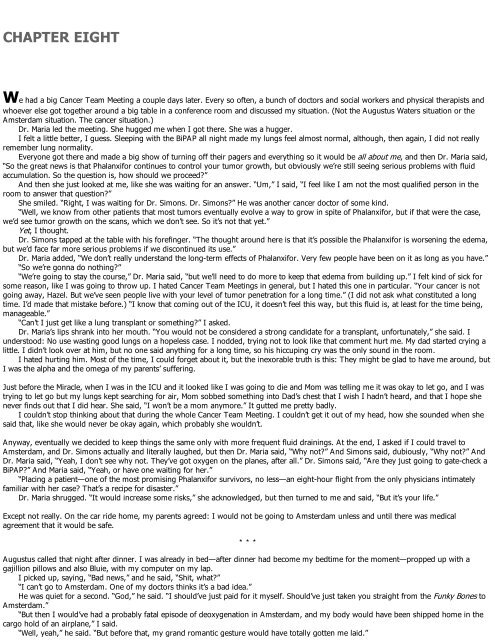Create successful ePaper yourself
Turn your PDF publications into a flip-book with our unique Google optimized e-Paper software.
CHAPTER EIGHT<br />
We had a big Cancer Team Meeting a couple days later. Every so often, a bunch of doctors and social workers and physical therapists and<br />
whoever else got together around a big table in a conference room and discussed my situation. (Not the Augustus Waters situation or the<br />
Amsterdam situation. The cancer situation.)<br />
Dr. Maria led the meeting. She hugged me when I got there. She was a hugger.<br />
I felt a little better, I guess. Sleeping with the BiPAP all night made my lungs feel almost normal, although, then again, I did not really<br />
remember lung normality.<br />
Everyone got there and made a big show of turning off their pagers and everything so it would be all about me, and then Dr. Maria said,<br />
“So the great news is that Phalanxifor continues to control your tumor growth, but obviously we’re still seeing serious problems with fluid<br />
accumulation. So the question is, how should we proceed?”<br />
And then she just looked at me, like she was waiting for an answer. “Um,” I said, “I feel like I am not the most qualified person in the<br />
room to answer that question?”<br />
She smiled. “Right, I was waiting for Dr. Simons. Dr. Simons?” He was another cancer doctor of some kind.<br />
“Well, we know from other patients that most tumors eventually evolve a way to grow in spite of Phalanxifor, but if that were the case,<br />
we’d see tumor growth on the scans, which we don’t see. So it’s not that yet.”<br />
Yet, I thought.<br />
Dr. Simons tapped at the table with his forefinger. “The thought around here is that it’s possible the Phalanxifor is worsening the edema,<br />
but we’d face far more serious problems if we discontinued its use.”<br />
Dr. Maria added, “We don’t really understand the long-term effects of Phalanxifor. Very few people have been on it as long as you have.”<br />
“So we’re gonna do nothing?”<br />
“We’re going to stay the course,” Dr. Maria said, “but we’ll need to do more to keep that edema from building up.” I felt kind of sick for<br />
some reason, like I was going to throw up. I hated Cancer Team Meetings in general, but I hated this one in particular. “Your cancer is not<br />
going away, Hazel. But we’ve seen people live with your level of tumor penetration for a long time.” (I did not ask what constituted a long<br />
time. I’d made that mistake before.) “I know that coming out of the ICU, it doesn’t feel this way, but this fluid is, at least for the time being,<br />
manageable.”<br />
“Can’t I just get like a lung transplant or something?” I asked.<br />
Dr. Maria’s lips shrank into her mouth. “You would not be considered a strong candidate for a transplant, unfortunately,” she said. I<br />
understood: No use wasting good lungs on a hopeless case. I nodded, trying not to look like that comment hurt me. My dad started crying a<br />
little. I didn’t look over at him, but no one said anything for a long time, so his hiccuping cry was the only sound in the room.<br />
I hated hurting him. Most of the time, I could forget about it, but the inexorable truth is this: They might be glad to have me around, but<br />
I was the alpha and the omega of my parents’ suffering.<br />
Just before the Miracle, when I was in the ICU and it looked like I was going to die and Mom was telling me it was okay to let go, and I was<br />
trying to let go but my lungs kept searching for air, Mom sobbed something into Dad’s chest that I wish I hadn’t heard, and that I hope she<br />
never finds out that I did hear. She said, “I won’t be a mom anymore.” It gutted me pretty badly.<br />
I couldn’t stop thinking about that during the whole Cancer Team Meeting. I couldn’t get it out of my head, how she sounded when she<br />
said that, like she would never be okay again, which probably she wouldn’t.<br />
Anyway, eventually we decided to keep things the same only with more frequent fluid drainings. At the end, I asked if I could travel to<br />
Amsterdam, and Dr. Simons actually and literally laughed, but then Dr. Maria said, “Why not?” And Simons said, dubiously, “Why not?” And<br />
Dr. Maria said, “Yeah, I don’t see why not. They’ve got oxygen on the planes, after all.” Dr. Simons said, “Are they just going to gate-check a<br />
BiPAP?” And Maria said, “Yeah, or have one waiting for her.”<br />
“Placing a patient—one of the most promising Phalanxifor survivors, no less—an eight-hour flight from the only physicians intimately<br />
familiar with her case? That’s a recipe for disaster.”<br />
Dr. Maria shrugged. “It would increase some risks,” she acknowledged, but then turned to me and said, “But it’s your life.”<br />
Except not really. On the car ride home, my parents agreed: I would not be going to Amsterdam unless and until there was medical<br />
agreement that it would be safe.<br />
* * *<br />
Augustus called that night after dinner. I was already in bed—after dinner had become my bedtime for the moment—propped up with a<br />
gajillion pillows and also Bluie, with my computer on my lap.<br />
I picked up, saying, “Bad news,” and he said, “Shit, what?”<br />
“I can’t go to Amsterdam. One of my doctors thinks it’s a bad idea.”<br />
He was quiet for a second. “God,” he said. “I should’ve just paid for it myself. Should’ve just taken you straight from the Funky Bones to<br />
Amsterdam.”<br />
“But then I would’ve had a probably fatal episode of deoxygenation in Amsterdam, and my body would have been shipped home in the<br />
cargo hold of an airplane,” I said.<br />
“Well, yeah,” he said. “But before that, my grand romantic gesture would have totally gotten me laid.”

















